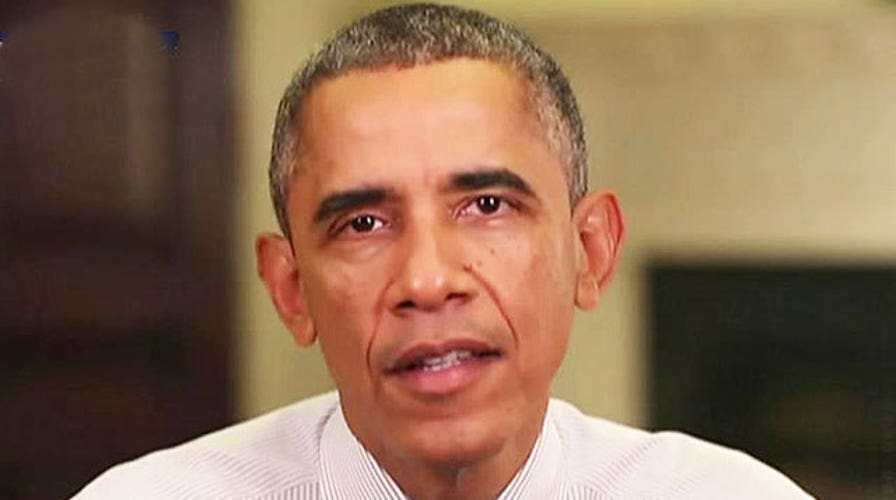Obama ignites new war with GOP over net neutrality
President calls on FCC to implement strict regulations
It has been a big month for the future of the Internet, and unfortunately it is not looking good. President Obama became the latest public figure to jump on the net neutrality bandwagon, ignoring both the results of the midterm elections and regulatory common sense by urging the Federal Communications Commission (FCC) to adopt draconian new rules under Title II of the 1934 Communications Act.
This proposal to regulate under an 80 year-old law meant for the monopoly telephone system is terrible for innovation and investment, the two pillars of the modern Internet. It is being pushed by far left advocacy groups and self-interested Silicon Valley companies like Netflix that are looking to extort a free ride from Internet Service Providers (ISPs).
Sadly, high profile figures like President Obama have also jumped aboard.
[pullquote]
Never underestimate corporate willingness to use Washington to help pad its profits. At a time when pressure to increase profitability is forcing executives to make hard choices about cutting costs, turning to politicians and regulators for a legal boost is an easy way to cushion the blow. Somehow, Netflix’s popular movie service blinds policymakers and politicians alike to the obvious intentions of their “net neutrality” advocacy.
Here’s the rub: Internet regulations won’t start and stop with the ISPs. In the era of convergence where Internet services at the network’s edge and core are becoming indistinguishable, these new regulations will sweep in Silicon Valley and its leading tech companies.
To move streaming video from its servers to your living room, Netflix must do business with the various companies that carry traffic throughout the Internet. As part of this normal operating procedure, Netflix has deliberately chosen to pay for the cheapest routes possible to deliver its traffic to the ISP networks. Unfortunately, as with anything else in life, you get what you pay for. These bargain bin connections get congested, and Netflix customers suffer poor service as a result.
Instead of paying to upgrade its traffic delivery or interconnection arrangements, Netflix has taken to Washington to demand that regulators set up a system where Netflix could force ISPs and others to accept its traffic at no cost whatsoever. Knowing that nobody would fall for this ploy if described accurately, Netflix has cynically branded its arguments as “net neutrality,” despite the fact that it is an unrelated issue. Amazingly, politicians from President Obama on down have fallen for the ruse.
But somebody has to pay the cost of Netflix’s connections. Inevitably, it will end up being all ISP customers who face higher bills, including Internet users who don’t even subscribe to Netflix. Netflix saves money, but every consumer, often those making lower incomes, will pay for this supposedly free lunch.
It is entirely self-serving for Netflix to take this approach and then cry foul to regulators, but then again with its content costs approaching $3 billion per year and rising, and the firm only increasing its original programming (A-list stars like Kevin Spacey do not come cheap), Netflix can be forgiven for looking anywhere it can to save money.
Netflix thinks it can invite the bull into the china shop and expect to escape without anything important getting smashed.
Having dealt with regulators and studied the impacts of regulation on business in all sectors throughout my business career, I can safely say that the odds are about zero of any government agency turning down such low-hanging regulatory fruit.
Lookout Google, Facebook, Amazon and all others that have any sort of market power online. President Obama and the FCC might be eying the ISPs right now, but eventually their gaze will turn to you.
Even worse, international regulators, ranging from European bureaucrats to Russian and Chinese censors, are salivating at the prospect of clamping down on American technology companies.
Every inch that Silicon Valley pushes in the United States will give autocrats the excuse they need to take a mile. This will destroy the current foundation of the Internet and cost Silicon Valley companies billions of dollars extracted by foreign regulators. When it comes to playing gatekeeper, ISPs have nothing on Vladimir Putin.
In the end, too much of this whole controversy comes down to the FCC taking too many liberties with antiquated and vague laws. Hopefully, the Republicans recent takeover of the Senate leads to a bipartisan approach to updating the extraordinarily outdated communications laws that are the root of the entire net neutrality controversy.
The House Energy & Commerce committee has already expressed its intent to move forward on new legislation.
If done right, this can provide a stable outline for further innovation across the Internet, spare all of us from the ongoing net neutrality charade, and take away any opportunity for rent seekers like Netflix to game the system for their own benefit at the expense of both users and innovators.

